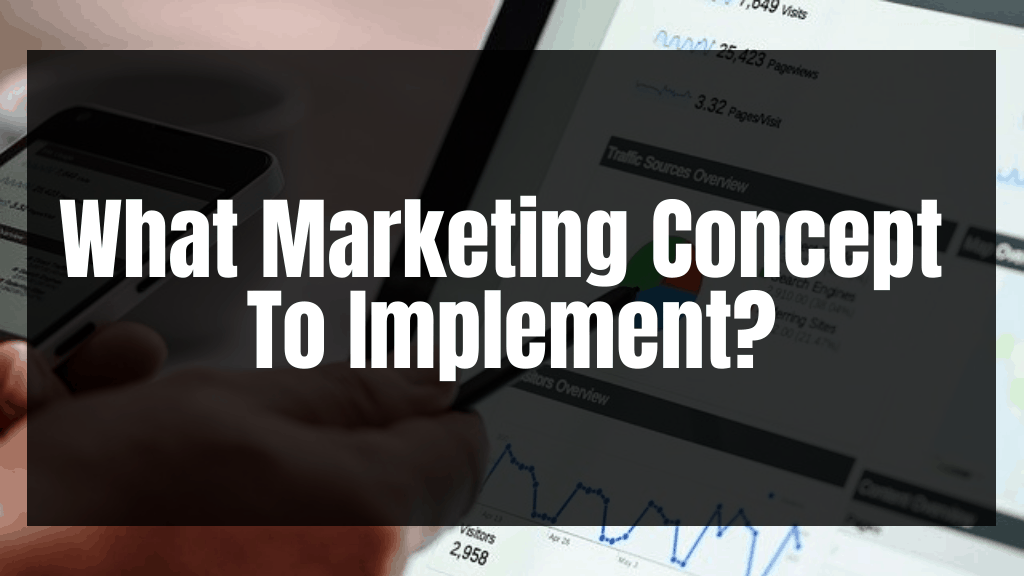When it comes to any business and the longevity of that business, marketing is the bloodline of that business’s success. The concept of marketing is simple- your primary job is to figure out what your potential customer wants or need. Once you have that narrowed down, the next goal is to get those goods and services in front of your customers to not only give them what they want- but to also exceed the expectations of that targeted audience. Satisfying the customer is key and having a marketing concept will not only help build your brand- but will also help you develop marketing strategies that will help increase sales and get ahead of the competition.
What Is a Marketing Concept?
In short, the marketing concept is simply using data to pinpoint what a specific audience or potential customer wants or needs. This data is needed to then establish marketing strategies to satisfy those needs and to satisfy the needs or goals of the business or brand. This concept is also known as the “right” concept. So, what marketing concept or philosophy should you use for your business? Let’s look at the five marketing concepts, also known as Marketing Management Philosophies, that has been widely adopted by many organizations. However, not every concept will be effective for every industry, but one or some should certainly line up with your business needs and goals.
1) Production Concept
The idea behind this concept is that consumers will prefer goods or services that are affordable and easily accessible. To offer this, a company’s focus turns to produce extremely high volumes of cheap products to maximize their profitability and scale. This marketing concept is one of the oldest philosophies that sellers live by- mainly due to the concept being established during the supply and demand era of the mid-1950s. This was also the same period of the production era and early Capitalism. This marketing concept, however, has its dangers when trying to produce products in mass quantities. The danger is that if not careful, the quality of goods may go by the wayside in efforts of pushing out more products. This oversight could lead to poor customer satisfaction leading to a high rate of customer service issues, a drop in sales, and a loss of customers.
Production Concept in Action
To utilize this marketing concept, many companies turn to other countries- mostly those overseas to assist in manufacturing their products. Most products that we throw in our shopping carts physically or virtually are made in China. This offshore manufacturing for the seller decreases cost which then can be passed along to the customer. When this route is taken, standards must be kept at a high to ensure product quality and complete customer satisfaction.
2) Product Concept
This marketing concept focuses more on the customer and creating top of the line products in which improvements will be done over time. The idea of this concept is that users prefer products with a high standard of quality, performance, and state of the art features. A great example of this is Apple, which has set itself apart as a company that has a high standard of supplying quality products with innovative features to their customers. With this marketing concept, the production output is not as important as servicing the customer’s want for high-quality products.
The product concept is widely utilized by the technology industry and just like Apple, other companies are constantly improving and releasing new products and new versions of existing products. However, being that this marketing concept is primarily focused on the customer- these companies need to understand two very important concepts (no pun intended). One of those concepts is not to release new products too soon. This will cause customer frustration once it is realized that not much has changed about the product. The second concept to understand is that, on the contrary, it will also leave customers frustrated if not enough updates come out in a timely manner. This will give the illusion that the company has fallen behind in the technological field. Therefore, it is important to keep in touch regularly with the users’ needs and expectations.
3) The Selling Concept
The selling concept is more interested in selling the intended products than building loyal customer relationships. This marketing concept believes that consumers will not buy enough of a company’s product unless they are persuaded to do so. The selling concept is also used when there is an abundance of products and the need to sell is a priority. This attitude though of dismissing what the market wants can carry high risk unless the company is savvy enough to find, convince, and sell customers on why they need to purchase their product even if they may not have a use for it. The hope is that even if the customer is dissatisfied with a product- they will eventually forget the disappointment and buy again.
An example of this philosophy can be seen with advertisements on home improvement goods and services. The potential customer may not have an immediate need for the product or service but could be persuaded into making a purchase if shown a benefit in having it. If this marketing concept is used, keep in mind that selling is only one part of having a successful business. The needs of the consumer are also important if what you are looking for is a long-term and loyal customer.
4) The Marketing Concept
Competition is what drives this marketing concept. The idea is that for the business to be successful, it needs to understand the needs and wants of its consumers better than the competition. Therefore, having a strategic marketing campaign is essential to deliver the right products to the right customers that are better than what the competitors offer. With this philosophy- it is believed that sales and profits will be achieved by staying focused on the customer’s needs. Some people confuse the marketing concept with the selling concept, but they are indeed different.
Difference Between “The Selling Concept” and “The Marketing Concept”
The major difference between the two concepts is the focus point. With the selling concept, the focus is only on selling. The focus is not on if the buyer needs or even wants the product. The marketing concept focuses primarily on the customer and its goal is to satisfy their needs and hopefully build a lifelong relationship with that customer. Simply put, the selling concept assumes poorly on what is needed whereas the marketing concept uses data to understand what is needed and wanted. Let’s take a closer look:
| START | FOCUS | MEANS | END RESULT | |
| THE SELLING CONCEPT: | Production/Factory | Existing Products/Overstock | Large-scale selling, Persuasion, Promotion | Profits Through High Sale Volume |
| THE MARKETING CONCEPT: | The Market | Customer Needs and Wants | Integrated Marketing | Sales and Profits by Way of Customer Satisfaction |
5) The Societal Marketing Concept
Would it not be great to make the world a better place? Well, that is the concept behind this modern-day marketing concept. The philosophy behind this concept is to be responsible socially as well as environmentally and still be able to meet the current needs of the consumer as well as having the ability to meet the needs of future generations. While other marketing concepts wavier between customer wants and seller wants, the societal marketing concept puts humanity atop of any profits and gains as well as atop of satisfying wants.
Examples of some companies that believe in “giving back” are Burt’s Bees with their natural care products. Their focus has always been on the greater good for society. The company also played a huge part in helping to develop The Natural Standard for Personal Care Products, which laid out guidelines for what could be determined to be natural.
METHOD is another company that believes in environmental safety over profits. METHOD successfully found an effective way to go against the norm and did away with the hazardous chemicals that are normally found in everyday household cleaning products. The company instead made a very effective and safe home and personal cleaning products made with natural ingredients. Even the packaging is biodegradable.
Marketing Concept and Relationship-Building
Relationship marketing is done by utilizing the “right” process. Again, this is the process of making sure that the right goods and services get to the right audience promptly and at the right place and right price. This is done by using and implementing the right promotional and marketing strategies. Many industries and companies have adopted this concept and have successfully identified the needs of its customer base and in turn- have produced products that have effectively satisfied their needs and wants.
This type of marketing will almost guarantee a long-term and loyal relationship between customer and seller. This priceless relationship will not only result in repeat sales, but it will also account for huge profits for the organization or business. Customers also benefit from this type of relationship in the form of stability and even incentives. Take for example the frequent-flyer program. Depending on which airline has your loyalty, as an incentive for your business, and after so many air miles, the customer will become eligible for a free ticket. Who could not use a free flight?
Customer Value
Believe it or not, the customer value is based on a mathematical equation. Customer value is determined based on the percentage of benefits for a customer, consumer, or an organization in correlation to what sacrifices would be needed to obtain those benefits on the business end. The belief behind customer value is that price is not the only factor to make a purchase. Instead, with this belief, customers will pay a higher price for a product based on exceptional customer service. Value is not in the price of a product; instead, the value should be looked at as the quality of the product or service given.
Creating customer value should be the goal of all businesses- especially if the goal is to become a successful business. With the marketing concept, the focus should not be on the cost of production and the cost passed to the customer. If this is the focus, then the standards of that company would be viewed as though the only difference between a product is the price. Providing customer value will almost guarantee a long-term customer relationship no matter the price because let’s be honest, if the customer is only there for price instead of loyalty- then they will give their business to the competition as soon as they offer a lower price. This is not what we want with the marketing concept.
Customer Satisfaction
Once healthy relationships are built with consumers, the hope is to keep those vital customers for the life of the business. Customer satisfaction is the bloodline of any organization. If a customer is not satisfied, or if their expectations are not met, it would be safe to say that they will shop around for another supplier. It would also be safe to assume that they might also share their dissatisfaction with word of mouth which could lead to more loss of business for you. Marketing research must be utilized to pinpoint specific expectations and once that has been identified an effective marketing strategy should be laid out to meet or even exceed those customer expectations.
Conclusion
Marketing concepts, if implemented correctly could help take your company from an unsuccessful one to a successful one if the needs and wants of the consumer is understood. While the marketing concept is customer driven with the goal of providing the right product for the customer, other philosophies and marketing concepts are not. Others have the goal of finding the right customer for the product but whatever the need of the company is, over time it may be determined that a mix of these marketing concepts will need to be followed. Several factors could determine the need for change such as competition, the market, and sales. All business needs are unique so finding the right concept for your business needs is the first step in growing your organization.






